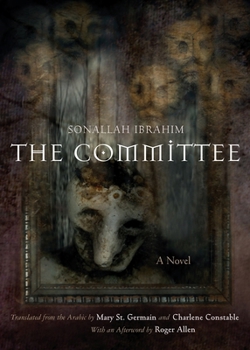The Committee
Select Format
Select Condition 
Book Overview
This wry take on Kafka's novel The Trial revolves around its narrator's attempts to petition successfully the elusive ruling body of his country, known simply as "the Committee." Consequences for his actions range from the absurd to the hideous.
Format:Hardcover
Language:English
ISBN:0815607261
ISBN13:9780815607267
Release Date:November 2001
Publisher:Syracuse University Press
Length:176 Pages
Weight:0.75 lbs.
Dimensions:0.7" x 5.5" x 7.4"
Customer Reviews
3 ratings
Speaking truth to power . . .
Published by Thriftbooks.com User , 18 years ago
First off, a caveat: The editorial reviews (above) for this fine, provocative novel do the disservice of revealing its entire story like Cliff Notes. Best to avoid reading them if you prefer the pleasure of discovering a novel's storyline as it's revealed by the author. In its 166 pages, this short novel has a lot on its mind. Readers eager to defend the benefits of unchecked globalization will no doubt take offense at the critique of its impact on lesser developed countries, including Egypt and the rest of the Arab world as represented here by Sun`Allah Ibrahim. Meanwhile, its vision of the individual overwhelmed by social and political forces beyond his understanding applies anywhere dissent is suppressed and might makes right, which can happen even in self-proclaimed "free" societies. There is plenty of Kafka and some Orwell in these pages, and the narrator's sardonic point of view owes much surely to the author's experience as a political prisoner during the tumultuous years of revolution in his home country. One does not suffer physically and psychologically for one's ideals and look respectfully at those whose chief objectives have been to amass power and wealth at the expense of others. Readers of any political persuasion should find the ironies at the center of this book a thought-provoking challenge to whatever they believe about what it means to be an individual in a binary world where people increasingly show up as survey results, digits on spreadsheets, and numbers in headlines.
Anti-Globalization meets Kafka
Published by Thriftbooks.com User , 22 years ago
Written from 1979-81, this short novel invites immediate comparison to Kafka's "The Trial". In it, an unnamed man is summoned to appear before a mysterious and apparently powerful committee who will apparently judge him in some way-although what this actually means is left unexplained. The first theme of the tale emerges when the committee asks him, "By which momentous event among the wars, revolutions, or inventions will our century be remembered in the future?" This results in a lecture on globalism (remember this was written over 20 years ago) via a capsule history of Coca-Cola and its proliferation across the world in the years after WWII. The second theme comes forth when the committee directs him to write "a study on the greatest contemporary Arab luminary." This drives him to research a powerful and mysterious man known simply as "the Doctor," a man with fingers in every conceivable pie. Given the timing of the writing, one could well read "the Doctor" as representing Sadat's "open-door" economic policies and the entire book as a satirical attack on those policies and the figures behind them. Despite the censorious obstacles in his path, the narrator manages to start uncovering nuggets of truth about "the Doctor." Unsurprisingly, this angers the committee and he is commanded to pick another subject which leads to a surreal (and satirical) climax.
Joins A Distinguished Group
Published by Thriftbooks.com User , 22 years ago
"The Committee", by Sun Allah Ibrahim joins the work of writers including Franz Kafka, Albert Camus, and Fyodor Dostoevsky. The comparison that is most easily drawn is to Kafka's, "The Trial". While this may be the easiest parallel to draw it suggests this is just a variation on a theme and that would be a disservice to this book and the author.The unnamed narrator first petitions a committee. This group is made of members we are told virtually nothing about. Our narrator only makes vague references to what a positive decision from this committee would mean to him. Whatever his goal, it must be of great value for during his first audience he is not only queried on his knowledge, his is degraded, pointlessly degraded. The similarities to other writings remain in regard to arbitrary and absolute authority; together with the perversions of thought and justice they produce. Unlike, "The Trial", there is no evidence he stands accused of anything on his initial hearing. The committee after a long delay sets for him yet another task, and when they learn of how he proceeds despite the blockades put before him, the group visits him, with a single member remaining. This shadow is the same individual who so crudely humiliated him before. The treatment again begins with the total invasion of everything that is held private for the individual, with the result that our narrator commits a crime, comes once again before the committee, and receives a surreal sentence.Throughout this fairly brief work the narrator in his appearances before the group, and in his private thoughts often expounds on his theories with seemingly bizarre examples. What becomes bizarre is that in their way his arguments make sense, and this is after Coca-Cola, peanut farming, cigarettes, anti-depressants, and presidential elections explain his thoughts.The sentence our anti-hero receives is described by the publisher as a new realm of satiric surrealism. Whether satiric or satanic, the ending is not one you will forget, and you may likely be drawn to read the work of other writers who wanted their subjects to stand firmly in existential space.






